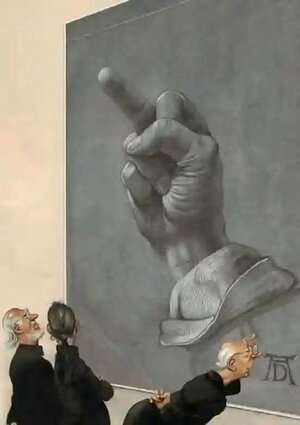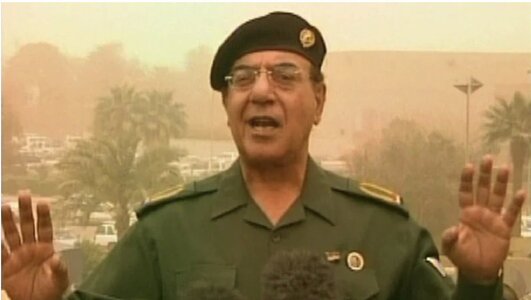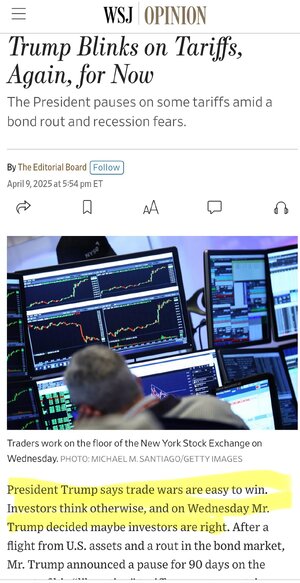- Messages
- 8,138
Navigation
Install the app
How to install the app on iOS
Follow along with the video below to see how to install our site as a web app on your home screen.
Note: This feature may not be available in some browsers.
More options
You are using an out of date browser. It may not display this or other websites correctly.
You should upgrade or use an alternative browser.
You should upgrade or use an alternative browser.
Tariffs Catch-All
- Thread starter BubbaOtis
- Start date
- Replies: 5K
- Views: 171K
- Politics
Bigs23
Inconceivable Member
- Messages
- 2,855
Dumb shit.
- Messages
- 39,185
- Messages
- 1,440
That’s gonna leave a mark.
- Messages
- 1,766
In his diaper.That’s gonna leave a mark.
- Messages
- 763
And right on cue, many on this board were wrong. People were saying Trump is alienating our trade partners. Now our trade partners are looking to negotiate with us and China is the bad actor here, not Trump.
I'd say people from other countries (especially our former allies) boycotting our products, booing our flag and anthem, and laughing their asses off at the most juvenile lunatic leader we've ever had, is pretty damn alienating. They also see Trump doing more good for Russia than Putin. Even Russian State media laughs at what a clueless pawn he is for them.
By the way, not one single deal yet. Trump was shown as the clown that intelligent Americans know him to be, and he caved and tucked tail after 99% of Economists, the stock and bond markets, and his biggest donors slammed him.
As I have always said, it doesn't matter what Trump does. If he does A his worshippers agree. If he does the exact opposite B (one day later), they also agree. Right on cue.
That is a cult.
Please stick around, your unintentional comedy is fun. And don't be gone so long again, like when Q1 GDP growth comes out less than one percent. Or when inflation hits retail which is very soon. And certainly not after all of Trump's billionaire friends, family, admin. etc. stop buying after the killing they made from the insider tip before his announcement/tweet. The short squeeze won't last either.
Last edited:
- Messages
- 1,568
Yup. He's literally an advertisement for "this is your brain on the Kool-Aid of right-wing media."Lol. Like clockwork.
heelslegup
Esteemed Member
- Messages
- 615
Given the influence of agricultuarla states in R party and the dependence of US agriculture on China importing key products, Trump will either have to cave to china or bail out US farmers (as he did last time)
- Messages
- 3,918
Trump is already taking about how Xi is a “smart guy” and he wants to make a deal. Trump will come off the Chinese tariffs, declare victory, and get back to suppressing citizens’ rights before you know it.Given the influence of agricultuarla states in R party and the dependence of US agriculture on China importing key products, Trump will either have to cave to china or bail out US farmers (as he did last time)
1moretimeagain
Inconceivable Member
- Messages
- 3,900
I feel a little bad for people in hollowed out towns that genuinely believed Trump was bringing their factories back, only to have him cater to the elites once again.
- Messages
- 1,552
I don't. FAFO they're the one's that voted him into office. Maybe they should have moved or retooled which putting Drumph back in office was a form retooling I suppose.I feel a little bad for people in hollowed out towns that genuinely believed Trump was bringing their factories back, only to have him cater to the elites once again.

- Messages
- 8,138
And his cult followers will swear that he won and created 400 Million jobs.Trump is already taking about how Xi is a “smart guy” and he wants to make a deal. Trump will come off the Chinese tariffs, declare victory, and get back to suppressing citizens’ rights before you know it.
Mulberry Heel
Inconceivable Member
- Messages
- 3,859
Trump has spent every day for the past week bragging that he wasn't going to back down, instead it was (literally) the rest of the world who would back down. It's the whole "I'm the biggest bully on the block" bullshit that he always does. Once he realized that stock markets were really tanking (shocking, I know) and that even some Congressional Republicans and members of his own base were starting to turn on him he chickened out and backed down like he's done numerous times before. But he had to save face somehow so he kept the tariffs on China, at least for now. Others in his administration may have a plan, but he never does - it's all done on childish impulse and anger and resentment and whatever else is crossing his mind at the moment. And he's continuing to cause long-term damage to our reputation, no matter how this ends. And what's also worth remembering is that these tariffs are only one horrible thing out of a hundred or more that he's done since taking office. We'll now just move on to the next shitshow.
Last edited:
heelslegup
Esteemed Member
- Messages
- 615
CNBC had an interview with the staunchly pro-Trump head of Apollo Global this morning. At one ppint he said: "Whatever you think of Inflational Recuction Act an CHIPS. plants are already umder construction." OopsI feel a little bad for people in hollowed out towns that genuinely believed Trump was bringing their factories back, only to have him cater to the elites once again.
heelslegup
Esteemed Member
- Messages
- 615
My late wife's father was a fairly senior exec (engineer) for Bethlehem Steel in Johnstown, PA. It wasn't China who closed those plants==it was folks like Carl Icahn, Wilbur Ross and other vulture capitalists not nearly as handsome as Michael Doublas in WAll Street (1987)
Mulberry Heel
Inconceivable Member
- Messages
- 3,859
Not long after Trump was elected for the first time in 2016 there was an article by a reporter - I think it was on Politico - which went to a dying former steel and coal town in PA and interviewed people there about why they voted for Trump, or if they didn't support him why they thought people in their town did.
And one story that has always stuck with me came from a guy they interviewed who was the director of a federal program set up under Obama to help "displaced workers" whose industries had either moved overseas or become mostly obsolete receive training for another career. What the guy said was that relatively few people in town had taken advantage of the program, because they just wanted their old jobs in the factories or mines back and didn't want to learn anything new or start another career. And I think that accounts for much of his base's support of these tariffs - they are convinced that this is the gold ticket that will bring all of their old jobs back and revive their towns. And that's not going to happen for various reasons that have been mentioned here, but these people are simply fooling themselves, and all that's going to happen is that the prices they pay for the cheap crap they buy and live on at Walmart and Dollar General and similar places is likely to go up, maybe way up.
Last edited:
Duke Mu
Iconic Member
- Messages
- 1,942
Wow...almost as if the system were rigged and this was a BANK ROBBERY. The FTC Chair stepped down and the Dem commissioners fired. How convenient.
1moretimeagain
Inconceivable Member
- Messages
- 3,900
Mulberry Heel
Inconceivable Member
- Messages
- 3,859
You'd think that if 75 countries (or any countries, really) had reached out then Trump, given his passion for publicity and bragging, would shout the names of those countries from the rooftops. It's almost like his claim that 75 countries have reached out is fake and that no one is buckling under his demands. Nah, surely Dear Leader and his minions couldn't be lying through their teeth. It's not like they've ever lied about anything else, amiright?
Duke Mu
Iconic Member
- Messages
- 1,942
Because they knew Trump was FOS and arranging a BANK ROBBERY.
Share:


